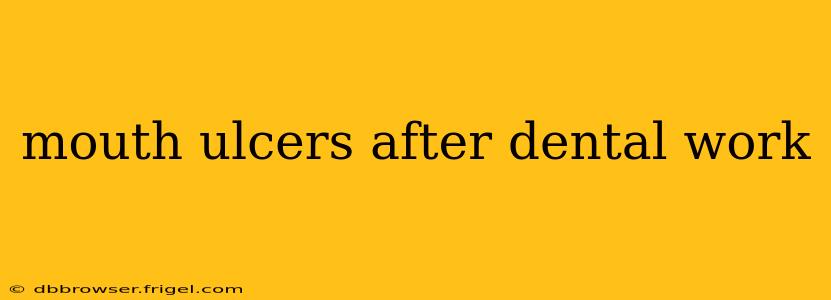Mouth ulcers, also known as aphthous ulcers or canker sores, are small, painful sores that can develop inside the mouth. While they can occur spontaneously, dental work is a common trigger. Experiencing mouth ulcers after dental work is unfortunately quite common, leaving many patients wondering about the cause and how to alleviate the discomfort. This comprehensive guide will explore the reasons behind this, along with effective treatment options and preventative measures.
What Causes Mouth Ulcers After Dental Work?
Several factors related to dental procedures can contribute to the development of mouth ulcers:
-
Trauma to the oral mucosa: The most frequent cause. Dental procedures, even minor ones like cleanings or fillings, can cause minor trauma to the delicate tissues lining the mouth. This irritation triggers an inflammatory response, resulting in the formation of ulcers. The scraping of instruments, injections, or the pressure of dental tools can all be contributing factors.
-
Infection: While less common, an infection following dental work can lead to mouth ulcers. This could be a bacterial or viral infection. Proper post-operative care is crucial in preventing such infections.
-
Stress: The stress associated with dental procedures can also weaken the immune system, making individuals more susceptible to mouth ulcers. Anxiety surrounding the procedure itself can play a significant role.
-
Medication side effects: Some medications used during or after dental procedures can have mouth ulcers as a side effect. Always inform your dentist about any medications you are taking.
-
Allergic reactions: Although rare, an allergic reaction to materials used during the procedure (such as latex gloves or certain dental materials) could manifest as mouth ulcers.
How Long Do Mouth Ulcers After Dental Work Last?
The duration of mouth ulcers after dental work varies depending on the severity of the trauma and the individual's healing process. Most minor ulcers will heal within 7-10 days. Larger or more severe ulcers may take longer, up to 2-3 weeks. If an ulcer persists beyond three weeks or shows signs of infection (increased pain, swelling, pus), it's crucial to consult a dentist or doctor.
What Home Remedies Can Help Soothe Mouth Ulcers?
Several home remedies can provide relief from the pain and discomfort of mouth ulcers:
- Saltwater rinse: Rinsing your mouth with warm salt water several times a day can help clean the area and reduce inflammation.
- Ice cubes: Applying ice to the affected area can help numb the pain and reduce swelling.
- Aloe vera gel: Aloe vera has soothing and healing properties that can help promote faster healing.
- Over-the-counter pain relievers: Pain relievers like ibuprofen or acetaminophen can help manage pain and inflammation.
Are There Any Prescription Treatments for Mouth Ulcers?
For persistent or severe mouth ulcers, your dentist or doctor might prescribe medication, such as:
- Steroid mouthwashes or gels: These can help reduce inflammation and pain.
- Topical anesthetics: These numb the area, providing temporary pain relief.
- Antiviral medications: If a viral infection is suspected.
How Can I Prevent Mouth Ulcers After Dental Work?
Prevention is key! Here are some steps you can take to minimize your risk of developing mouth ulcers after dental procedures:
- Good oral hygiene: Maintaining excellent oral hygiene before, during, and after dental work is crucial. This includes brushing and flossing regularly.
- Gentle rinsing: Use a gentle, alcohol-free mouthwash after dental procedures to help keep the area clean. Avoid harsh mouthwashes which can further irritate the tissues.
- Stress management: Practice stress-reducing techniques before and after dental work, such as meditation or deep breathing exercises.
- Proper nutrition: A healthy diet rich in vitamins and minerals can support the immune system and promote healing.
- Communication with your dentist: Inform your dentist about any concerns or previous history of mouth ulcers.
Can Mouthwash Help Prevent Mouth Ulcers After Dental Work?
While mouthwash can help maintain oral hygiene and prevent infection, it's not a guaranteed preventative measure against mouth ulcers caused by trauma during dental work. The focus should be on gentle cleansing to avoid further irritating the area. An alcohol-free mouthwash is preferable to reduce the risk of further irritation.
When Should I See a Dentist About Mouth Ulcers After Dental Work?
Seek professional dental care if:
- The ulcer is unusually large or deep.
- The ulcer lasts longer than three weeks.
- You experience severe pain or swelling.
- The ulcer shows signs of infection, such as pus or bleeding.
- You have a fever or other signs of illness.
This information is for general knowledge and does not constitute medical advice. Always consult with a qualified healthcare professional for any health concerns or before making any decisions related to your health or treatment.
